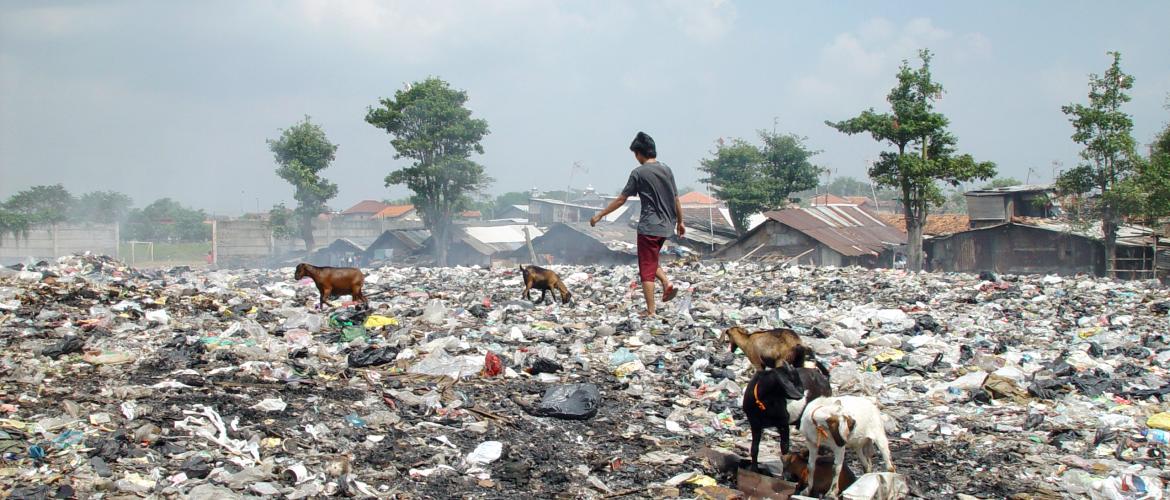Canada’s trash in Philippines
May 27, 2019 | Expert Insights

Background
103 containers of household trash, including plastic bottles and bags, newspapers and diapers, were shipped in batches from Canada to the Philippines from 2013 to 2014. Most of the shipping containers remain in two ports in Manila and northern Subic Freeport, sparking protests from environmental activists. Philippine officials say they were falsely declared by a private firm as recyclable plastic scraps and have asked Canada to take back the garbage.
The Philippines' recalled its representatives to Canada after it missed a May 15 deadline to retrieve the garbage from Manila. Presidential Spokesman Salvador Panelo described the move as a warning that diplomatic ties between the 2 nations may end.
By 2016, half the world’s plastic scrap intended for recycling was traded internationally. Developed countries have resorted to exporting their plastic waste to developing countries, while developing countries are increasingly suffering from the consequences of poor waste mismanagement, leading to calls for an international agreement against plastic waste trade.
Analysis
The Canadian government has hired shipping firm Bolloré Logistics Canada to retrieve heaps of trash illegally dumped by a Canadian firm in Manila. In a statement, Catherine McKenna, Minister of Environment and Climate Change, said it has awarded a contract to bring the waste back promptly and to ensure its safe and environmentally sound disposal. “Canada has amended its regulations to prevent this from happening again and is looking at ways to hold the responsible parties to account," she said.
Prime Minister Justin Trudeau said last week that Canada has been working hard with Philippine officials and hopes to strike a resolution shortly. The Canadian government said the company will begin preparation for shipping in the coming days. "The removal will be complete by the end of June, as the waste must be safely treated to meet Canadian safety and health requirements. The safe and environmentally sound disposal in Canada of the waste material will take place before the end of summer 2019," the statement read.
Philippine presidential spokesman Salvador Panelo earlier held a news conference to announce that Duterte has ordered officials to look for a private shipping company to transport the garbage to Canadian territory in an escalation of his increasingly adversarial stance. The Philippines will shoulder the cost of the garbage shipment, Panelo said. "If Canada will not accept their trash, we will leave the same within its territorial waters or 12 nautical miles out to sea from the baseline of any of their country's shores," Panelo said. "The president's stance is as principled as it is uncompromising: The Philippines as an independent sovereign nation must not be treated like trash by other foreign nations. Trash from at least 26 containers have been buried in a Tarlac landfill.
Assessment
Our assessment is Canada's agreement to take back the garbage, which has been rotting for up to six years in Manila, may end the strife, but the wider conflict is just beginning as wealthy nations face mounting resistance from developing countries fed up with being dumping grounds.
It can be noted that it is easier for the West to ship the waste than process it at home. ‘Waste colonialism’ was coined when developed countries began to adopt stringent regulations on the toxic waste that made disposal within their own borders too expensive. They began to export waste to low-income countries that were eager to increase their foreign exchange earnings, even at the cost of their citizens’ well-being.
According to the Basel Convention on Control of Transboundary Movements of Hazardous Wastes and their disposal, the waste should be disposed of responsibly and its exports to developing countries should only be done with the receiving country’s prior informed consent (PIC). We feel that there is a need to strengthen the convention as well as make developed countries accountable for managing their own waste. Countries should likely address the inequality of waste management infrastructure between developed and developing countries.
It is known that companies often export their hazardous wastes to poorer countries through illegal smuggling. Attempts to regulate this market have been hindered as many countries do not have any authoritative legislative bodies in place to prevent or punish the illegal trafficking of hazardous wastes.








Comments